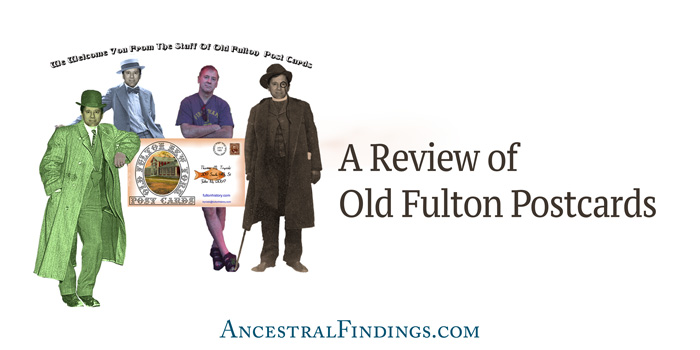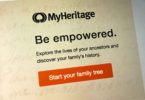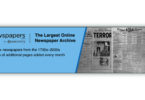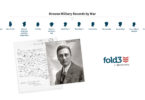Old Fulton Postcards is a wonderful and little-known site for genealogical research for people with New York connections. The site is totally free, which makes it even better. It contains over 23 million scanned pages from old newspapers, most of them from New York, though a few are from other states and even Canada. The newspapers go all the way back to the early 1800's and all the way up to the 1980's. The site is searchable in a number of different ways, and learning to search in the best way will ensure you get the results you need without having to scroll through thousands of results. Best of all, by discovering mentions of your ancestors in old New York newspapers (which include newspapers from across the entire state), you may solve long-standing family mysteries and discover information you would never have found anywhere else.
What the Website Looks Like
The site is divided into two sections. The left side is where the search box is located. The right side is full of scrolling conversations between people who are logged into the site. You can choose to create a free account, log in, and converse with other users, but this is not necessary to use the site. Once you start searching and click on your first newspaper article result, the right side of the page will change from showing the conversations between members to showing a PDF of the newspaper page you selected. You can then scroll through the page to read what's on it and look for the name you searched.
How to Search the Site to Get the Best Results
It can be a bit overwhelming to search Old Fulton Postcards at first. If you type a name into the search box, you can potentially get thousands of results from dozens of different newspapers (unless the name is a very unusual one). The good news is that there are ways of searching the site that will narrow down the number of results it gives you and ensures the accuracy of those results.
The best way to search for beginners is simply to put your person's name in quotation marks. If you don't do this, you will get results for all newspapers that have the first and last name individually. Putting the name is quotations ensures that the search results you get back will include only those results that have both names together. If you know the general area your ancestor lived in, you can scroll through your search results at this point and look for results of name matches in newspapers in that ancestor's particular area of New York.
Don't automatically exclude newspapers from outside the area, though. Just like today, news traveled, and if something was of particular interest, it might make its way into newspapers around the state. Also, social columns were very popular in the late 1800's and early 1900's. If your ancestor traveled to visit relatives in a different location, that visit might be announced in a newspaper in a different area from where they lived (and also show you were previously unknown related people may have lived, as well as give you their names and relationships to your ancestor).
The Drop-Down Box:
Beside the search box is a drop-down box with options for searching. You can search “all of the words,” “any of the words, “the exact phrase,” and “boolean.” “All of the words” means you want your search results to contain all of the words you've entered. “Any of the words” means your search results can contain any word or words in your search request but doesn't have to contain all of them. “The exact phrase” means you want search results that give you the words you entered in the exact order you entered them. “Boolean” is essentially the same as an “exact phrase” search, except you can include a wildcard symbol in your search request, such as in cases where you aren't sure of the spelling of a name, or if you think the newspaper may be likely to spell an unusual or difficult name incorrectly.
Fuzzy Searching:
If you aren't sure how to spell a name or believe the newspaper may have spelled it wrong (especially if you've seen it spelled incorrectly in other results), you can request a fuzzy search by clicking the box for it under the search box. You can then choose a number of characters of fuzziness. This means your search results can be off by however many letters you indicate. This can help you find results that are relevant to you that might otherwise have remained hidden.
Finding Your Results in the Newspaper Pages
When you click on a search result that looks promising, the newspaper page will load on the right side of the site. Sometimes, there can be a lot of print on that page. Unless you see the name you're looking for right away (such as in a prominent headline), you may need some help finding it.
There is a little magnifying glass symbol at the top left of the screen above the newspaper page. Click on that and a box will appear. Type the name you're searching for in the box in quotation marks, then click the “highlight all” box beside it. The name you're looking for will be highlighted and much easier to find. To make the print larger so you can read the article associated with the name you've discovered, click on “automatic zoom” in the middle of the page above the newspaper viewing box, and indicate the percentage you want the print to be enlarged. You will be able to read all about your ancestor with ease.
Old Fulton Postcards is an excellent and invaluable resource for anyone who is doing genealogical research into anyone who lived in New York state or visited it. You will discover so many things about your ancestors that you never knew if you take the time to learn how to use the site to its fullest potential. Don't let its slightly confusing layout deter you. It is easier to use than it looks. Play around with it. Look at the FAQs section if you feel like you need deep searching advice.
Try adding the name of a newspaper or the name of a town or county to your name search. You can even add a date to your name search if you know one that might yield results. The more you use the site, the more you will become at ease with it. Once you're comfortable with the site, it will be of tremendous use to you in your genealogy.
Free New York Lookups:
- Early Settlers of New York State, 1760-1942
- State Index: Upstate New York, 1685-1910
- Early New York Families, 1600s-1900s
- New York in the Revolution and War of 1812 Military Records
- Marriage Index: New York #2, 1740s-1880s
- Marriage Index: Selected Areas of New York, 1639-1916
- Marriage Index: New York City, 1600s-1800s
- 1870 New York City, New York & Long Island Census Index
- Passenger and Immigration Lists: New York, 1820-1850
- Genealogical Records: New York, 1675-1920
- New York Deaths, 1700s-1900s
- New York Revolutionary War Records, 1775-1840





